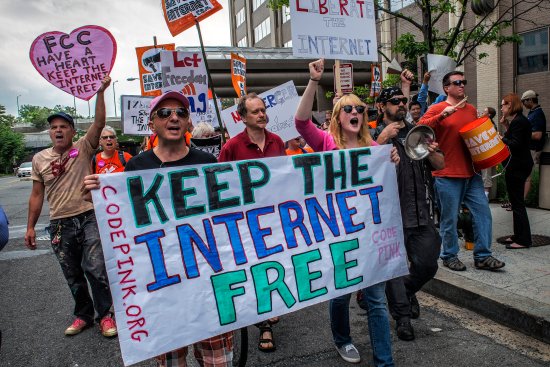
Proponents of net neutrality are winning the public debate, although that doesn’t mean they’ll win the policy fight.
A new report (PDF) released today by the John S. and James L. Knight Foundation shines some light on the debate about net neutrality that’s playing out in Washington, DC these days.
The Federal Commission is expected to release new rules on net neutrality—the idea that Internet Service Providers should treat all web content equally—sometime next year.
Here are some highlights from the report.
1. Men loooove net neutrality. By analyzing news reports, blogs, Twitter, and about a third of the 3 million comments submitted to the FCC this year, the report found that 69% came from men, and 63% from metro areas.
2. And pretty much everyone else on the Internet loves it, too. Let’s put it this way: if you took all the public comments about net neutrality that you could find on Twitter and all the public comments submitted formally to the FCC, and you put a yellow dot on a map for all those in favor of net neutrality and a green dot for all those against it, the entire map would be yellow.
3. The public does not find the concept of net neutrality confusing. Sure, the infrastructure of the back-end of the Internet is complicated, but when it comes to articulating their opinions on net neutrality, the public isn’t intimidated. Of the 1.1 million comments to the FCC that the report analyzed, 40% were “unique responses.” That means that people took the time to write down their own thoughts on the issue, rather than just submitting a form letter prepared by an advocacy group. “This is higher then the typical 10 to 20 percent seen with other regulations,” the report said.
4. Instead of expensive lobbying, net neutrality advocates rely on pushing the public debate. Organizations hoping to get the FCC to pass the strictest-possible rules on net neutrality have staged protests, bought advertising, and launched sophisticated social media campaigns to win public support on the issue. But while they used to have a lock on influencing the public, that’s starting to change. Comcast, for example, “has recently pushed through corporate announcements and advertisements to promote their own open internet philosophy,” the report found.
5. Even the big ISPs lobbying on the issue claim to be in favor of net neutrality. Verizon, Comcast and AT&T, among others, have collectively spent $238 million on lobbying, according to the report, which analyzed roughly 2,500 disclosures from 2009 to the second quarter of 2014. While most ISPs claim their lobbying efforts are pro net-neutrality, their definition of net neutrality generally differs a bit. For example, the ISPs think web companies should pay for special, faster, or prioritized access to web users; pro-net neutrality advocates say such “paid prioritization agreements” ≠ net neutrality.